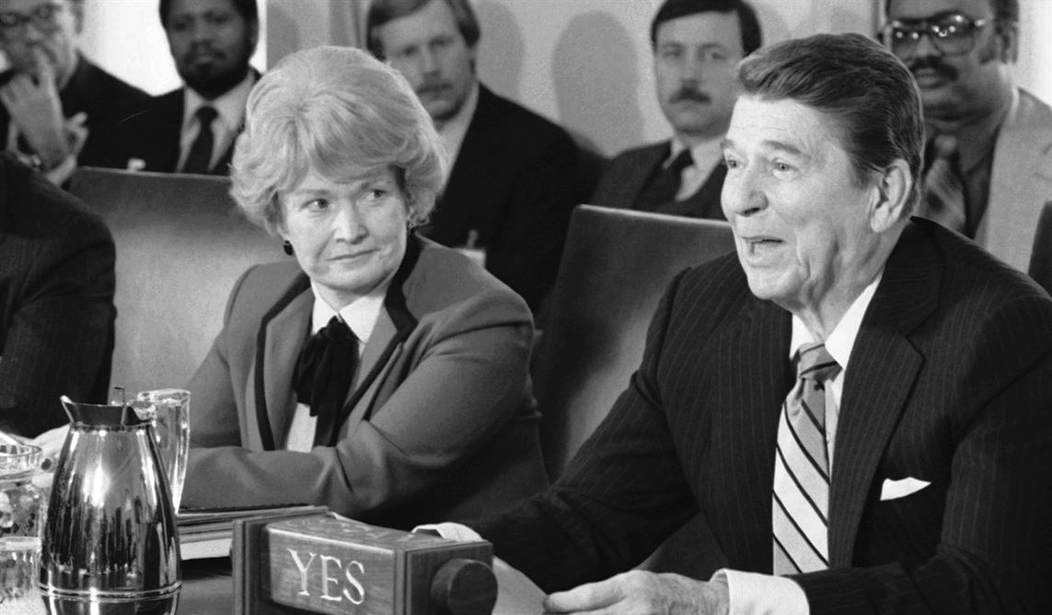Writing and reading history is one of the greatest joys of life. Writing about Ronald Reagan and WWII has been singularly pleasurable for me. What was it the philosopher Erasmus said, “When I have a little money, I buy food and clothes. But anything I have left over, I buy books.” Now, we study history for many reasons: for the sheer joy of reading; of knowing more than the next guy, or as the noted teacher George Santayana said, just to learn about not repeating failures - “Those who fail to study history are doomed to repeat it.” Teddy Roosevelt said much the same thing.
Down through the ages, from Benjamin Franklin to C.S. Lewis to Dorothy Parker, all have observed the importance of studying history. Some of them have actually made great statements about the study. Franklin once said you should either live a life worth writing about, or write things worth reading.
President John Kennedy lamented that his shipboard captains in 1962 had not read the masterpiece, The Guns of August by Barbara Tuchman, for which she won the Pulitzer, about how the world blundered into World War I through a series of little things that started with the assassination of Archduke Ferdinand of Austria by a crazed young Serbian. Kennedy wanted to avoid the same mistakes in the Cuban Missile Crisis. The pseudo-intellectual snobs of the academy didn’t consider Tuchman a true historian because she had not led a college department. But unlike the pseudos, she wrote a great book.
It is sadly becoming increasingly difficult to separate good history from bad history because of the failure of public schools. I am reminded of a spinster lightweight who was a principal at our children’s grade school years ago. She was shallow, superficial, didn’t known her isms, in short the perfect liberal useful idiot. Lenin would have loved her. She didn’t possess the ability or strength of character to question authority and the study of good history was a minor disturbance.
History should be explored, studied and savored. History should not be manipulated to make a political point as in the case of the 1619 Project. The 1619 Project is a pack of lies manipulating facts to serve a political purpose. Everything associated with the 1619 Project should be discounted including the harebrained fallacy that the American Revolution was fought to protect slavery. Black slavery and white indentured servants have their proper place in history, but they are not central to American Revolution history. That war came 90 years later with the properly identified and neutrally identified War Between the States. If the 1619 Project had been presented to me in a term paper, I would have given it a resounding “F” and a stern lecture to the offending student.
Recommended
America has had a Poet Laureate for many years but I’ve often said that what America needs is a Historian Laureate. Imagine if a historian was there to tell George W. Bush that no one had successfully invaded Afghanistan since the days of Hannibal? Or if a historian had been present to tell Jimmy Carter the real intentions of the Soviets? Or if a historian was available to tell Richard Nixon of Teapot Dome on the eve of the Watergate break in, and the headaches it brought President Warren G. Harding?
The list I have compiled here is by no means complete. So many excellent books by so many historians have been written. Discounted here automatically are plagiarists. Plagiarism is just a lazy way of recording history. As far as I am concerned it is a scarlet letter one must bear for life as if they were banished from a sports hall of fame for cheating. Some judgments must be lifetime.
The assemblage is subjective, just a few of my favorite works, discounting my own books and, as a writer, I am forever remembering there is just one consonant’s difference between “book” and “kook.” As I look over the list, I see a few friends, many strangers, but all great historians and writers. I imagine my joy to be in a room, surrounded by this extraordinary talent, just listening and soaking it in. I am envious of their fine talents. Some books are by liberals, some are conservatives, some I truly don’t know. All are excellent chroniclers of American history.
- Democracy in America by Alexis de Tocqueville---Is the leading book of observations of the United States by a non-American, and the development of American social and political life.
- The Federalist Papers by Alexander Hamilton, James Madison and John Jay—The important essays that supported ratification of the U.S. Constitution. Important. Essential.
- The Age of Jackson by Arthur M. Schlesinger—A very important study of the period from 1820-1860 and the expansion of the United States.
- Miracle at Philadelphia by Catherine Drinker Bowen—A work of history drawn from primary sources. It detailed the compromises necessary to establish the Constitution. Written years ago, it stands as the definitive story of the crafting of the US Constitution.
- The Power Broker: Robert Moses and the Fall of New York by Robert Caro—An important character study in the accumulation and execution of power by an unelected official.
- Memoirs of Ulysses S. Grant—One of the most honest works by a former U.S. President ever written.
- Moonshot by Douglas Brinkley. The definitive story of America’s quest to put the first man on the Moon.
- Battle Cry of Freedom by Robert McPherson—A comprehensive history of the political and cultural life of the United States from the Mexican War through the Civil War.
- Voices of Valor: D-Day June 6, 1944 by Douglas Brinkley—A key work in preserving the memory of the brave men who liberated Europe on D-Day.
- Profiles in Courage by John F. Kennedy—A Pulitzer Prize-winning book by the future U.S. President on the courageous acts of American senators. JFK, when he was a badly injured was tasked with researching and writing about the greatest U.S. Senators for the U.S. Senate. This book came out of that effort.
- A Thousand Days: John F. Kennedy in the White House by Arthur Schlesinger A superb firsthand observation of one of the most hopeful and tragic presidencies.
- Truman by David McCullough—A thoroughly researched volume on an until-then overlooked president. It singlehandedly revived interest in Truman and his presidency. He should be commended for his other works including John Adams and 1776 as well. Superb.
- American Lion: Andrew Jackson in the White House by John Meacham—A detailed study of the seventh president in the White House. The author’s research included many previously unavailable documents. Meacham is a superb historian and the author of many other fine works of history including Thomas Jefferson: The Art of Power. Meacham also possesses a first rate temperament.
- April, 1865 by Jay Winnik is an excellent book covering the last days of the Civil War including the assassination of Abraham Lincoln.
- Manhunt by James Swanson is a personal favorite of mine, detailing the nationwide search for John Wilkes Booth and his accomplices in an attempt to decapitate the U.S. government.
- Washington by Ron Chernow is the irrefutable biography of Washington even as Chernow mistakes Washington’s mother Mary Ball Washington’s character and temperament.
- An Unfinished Life by Robert Dallek is a consummate biography from birth to death of JFK.
18. The British are Coming by Rick Atkinson is a great, great read about the American Revolution. Splendid.
- Governor Reagan by Lou Cannon is the definitive story of Reagan’s years as governor by the man in the American press corps who knew him best. Masterful.
- A Pope and a President by Paul Kengor. An important and detailed story of the strong, personal relationship between Ronald Reagan and Pope John Paul II and their victory in the Cold War over the Soviet Union. Essential reading.
- The Age of Reagan by Steve Hayward. This large work is a triumph, taking the reader over two volumes from the early days of Reagan right through the monumental two terms as president. Important.
- Reagan, A Life In Letters by Annelise and Marty Anderson and Kiron Skinner. It is a review of Reagan’s many, many letters to hundreds of people, both important and, quiet, everyday people. As it shows, Reagan, the man of letters, was a true intellectual, refuting the canards of some on the left.
- The Burning of the White House: James and Dolley Madison and the War of 1812. By a great and noted historian Jane Hampton Cook, she writes with verve and knowledge about this seminal event. Much more is expected from this fine writer.
- How Ronald Reagan Changed My Life, by Peter Robinson, is an important insiders book by one of Reagan’s treasure trove of prized presidential speechwriters. Mari Maseng Will, Clark Judge, Landon Parvin, Ben Elliot, Peter Hannaford, Ken Khachigian, Aram Bakshian are just a few of Reagan’s speechwriting crew, the greatest collection of White House speechwriters in history, Reagan’s own in house think tank and his favorite department in the White House.
- Ronald Reagan: Fate, Freedom and the Making of History by liberal John Patrick Diggins who, in this book, says that Reagan is one of our four greatest presidents alongside George Washington, Abraham Lincoln and Franklin Delano Roosevelt.
As I have indicated, this list is by no means complete or comprehensive. But I think it is a good cross section of the best of American writers and historians. Historian Doug Weed has written a number of fine books and he is unusual in that he is an unabashed truth teller making all his presidential books a “must” read. And there are a few others like him: Courageous in their principles.
I hope you will enjoy each book as much as I have. And I hope you will enjoy reading my books as much as I enjoyed writing them.

























Join the conversation as a VIP Member